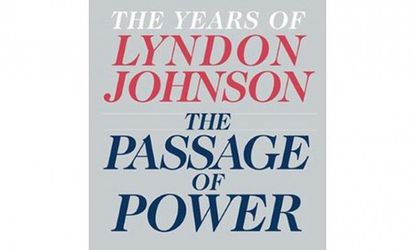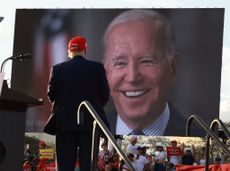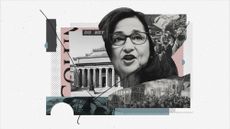The 5 best nonfiction books of the year
Looking for a great book to get you through the holidays? Read on

1. Behind the Beautiful Forevers
by Katherine Boo (Random House, $27)
Katherine Boo "is one of those rare, deep-digging journalists who can make truth surpass fiction," said Janet Maslin in The New York Times. In 2007, Boo embedded herself in Annawadi, a swampy, half-acre slum hidden behind a concrete wall near Mumbai's airport. For three and a half years, she recorded the human drama. Much of her book centers on Abdul, a teenage garbage collector who, in a horrific twist, becomes a pawn in India's corrupt and graft-ridden criminal justice system when a crazed neighbor sets herself on fire and frames him as the culprit. "Comparison to Dickens is not unwarranted." In "exquisitely accomplished" prose, Boo renders Annawadi and its residents' futile strivings without condescension and with heartbreaking completeness. This is not "poverty porn," said Thrity Umrigar in The Boston Globe. Boo has written "an astoundingly honest, nonexploitative piece of journalism" that gives a "powerful and insightful" look at "how the world's poor live, die, and hope in the age of globalization."
Subscribe to The Week
Escape your echo chamber. Get the facts behind the news, plus analysis from multiple perspectives.

Sign up for The Week's Free Newsletters
From our morning news briefing to a weekly Good News Newsletter, get the best of The Week delivered directly to your inbox.
From our morning news briefing to a weekly Good News Newsletter, get the best of The Week delivered directly to your inbox.
A caveat: Boo's attention to Annawadi's minutest details "occasionally blinds her to India's bigger picture," said Patrick French in Bloomberg Businessweek.
2. Wild
by Cheryl Strayed (Knopf, $26)
"'Brave' seems like the right word to sum up Cheryl Strayed and her book," said Malena Watrous in the San Francisco Chronicle. Strayed was in her mid-20s in 1995 when — reeling from a recent divorce and still haunted by the death of her mother — she set off to find herself by solo-hiking 1,100 miles on the Pacific Crest Trail. Strayed's "remarkable" memoir about that crucial life passage teems with honest self-discovery, all hard won. The younger Strayed we get to know goes eight days without seeing another soul. She loses her boots over a cliff. Crucially, she grieves fully for her mother and stares down her demons. Imagine Eat, Pray, Love written by a working-class woman who kicked a heroin addiction, said Melanie Rehak at Slate. Strayed's journey doesn't heal her, but it does lead to "a great unspoken truth of adulthood — that many things in life don't turn out the way you want them to, and that you can and must live through them anyway."
Sign up for Today's Best Articles in your inbox
A free daily email with the biggest news stories of the day – and the best features from TheWeek.com
A caveat: Strayed is sometimes too self-pitying, said Scott Parker in the Minneapolis Star Tribune.
by Robert A. Caro (Knopf, $35)
The fourth volume of Robert Caro's epic biography of Lyndon Baines Johnson ranks as the "best installment" yet in the acclaimed series, said Wendy Smith in the Los Angeles Times. Caro has been researching and writing his project 10 times longer than Johnson's tenure as president, and this time out he zeroed in on a period that seems to have included LBJ's deepest low and greatest accomplishment — the years between his failed 1960 presidential bid and the strong-arming he performed to secure passage of the landmark 1964 Civil Rights Act. "The introduction of the Kennedy clan" in this volume "elevates Caro's tale to the level of Shakespearean drama," said Dan DeLuca in The Philadelphia Inquirer. Wracked by insecurities, Johnson wastes his three years as vice president brooding, but he rises to the occasion after John F. Kennedy's assassination. The shooting and the days after are "vividly brought to life," and Johnson's bitter rivalry with Robert Kennedy becomes palpable in these pages.
A caveat: Caro is "not exactly partial to verbal economy," said David Greenberg in The Washington Post.
by Anne Applebaum (Doubleday, $35)
How soon we forget the speed with which Stalin's Soviet Union "imprisoned half the European continent," said Jennifer Siegel in The Wall Street Journal. Anne Applebaum's "epic but intimate history" of life behind the Iron Curtain in the first decade after World War II offers a lesson in how quickly totalitarianism can triumph. Drawing on fresh interviews and newly opened state records, Applebaum shows how the USSR used a combination of deception, intimidation, and perks to easily co-opt local leaders and whole populations into supporting the emerging police state. "Collaboration and craven betrayal were rife, but there was also resistance," said Karen R. Long in the Cleveland Plain Dealer. Applebaum documents how even whistling and clothing choices became a way for everyday citizens to register their dissatisfaction with their rulers. Iron Curtain is "essential reading," even if only to help us imagine what it's like to live in Tibet or North Korea or Cuba, under conditions "still cloaked from our eyes."
A caveat: Iron Curtain focuses only on Poland, East Germany, and Hungary, leaving many Eastern bloc nations untouched, said Keith Lowe in The Telegraph (U.K.).
by Andrew Solomon (Scribner, $38)
Andrew Solomon's "monumental" new book is "a bold and unambiguous call to redefine how we view difference," said Carmela Ciuraru in USA Today. The New Yorker staff writer interviewed more than 300 families to explore what happens when parents bring children into the world who are radically unlike them, whether owing to Down syndrome, dwarfism, or sexual orientation. The result is "a stunning work of scholarship and compassion." Solomon captures up close the ways that parents who are raising abnormal children suffer, but also the ways that they are enriched by the experience. Across rough terrain, Solomon proves "a calm and likable guide," said Julie Myerson in The New York Times. He's produced "a passionate and affecting work that will shake up your preconceptions and leave you in a better place." No one who reads all 700 pages could fail to emerge from the experience as "a more imaginative and understanding parent — or human being."
A caveat: "Solomon is a lumper," said Kathryn Schulz in New York. He far too readily equates the challenges of living with a minor differentiating trait with the challenges of living with a serious physical or mental disability.
How the books were chosen
Our rankings were created by weighting the end-of-year recommendations published in The Atlantic, CSMonitor.com, Minneapolis Star Tribune, Newsday, The New York Times, NPR.org, O magazine, Publishers Weekly, St. Louis Post-Dispatch, Slate, Time, and The Washington Post.
Create an account with the same email registered to your subscription to unlock access.
-
 'Voters know Biden and Trump all too well'
'Voters know Biden and Trump all too well'Instant Opinion Opinion, comment and editorials of the day
By Harold Maass, The Week US Published
-
 Is the Gaza war tearing U.S. campuses apart?
Is the Gaza war tearing U.S. campuses apart?Today's Big Question Protests at Columbia University, other institutions, pit free speech against student safety
By Joel Mathis, The Week US Published
-
 DOJ settles with Nassar victims for $138M
DOJ settles with Nassar victims for $138MSpeed Read The settlement includes 139 sexual abuse victims of the former USA Gymnastics doctor
By Justin Klawans, The Week US Published